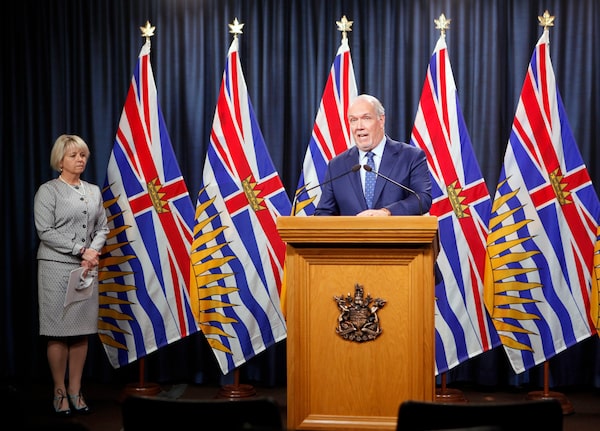
Provincial Health Officer Dr. Bonnie Henry looks on as Premier John Horgan speaks about the COVID-19 vaccine card set to arrive in mid-September as they discuss details about the process during a press conference at provincial legislature in Victoria, Monday, Aug. 23, 2021.CHAD HIPOLITO/The Canadian Press
Business owners and law enforcement are asking for more support as British Columbia gears up to implement a COVID-19 vaccine card system in mid-September.
As of Sept. 13, residents will need a vaccine card to get into restaurants, clubs, ticketed sporting events and organized affairs like weddings as the risk of infection is 10 times higher among those who are not immunized. After Oct. 24, those aged 12 and up will need to be fully vaccinated at least seven days earlier, and only children below that age will be exempt from entering establishments if they are with adults who have been fully vaccinated.
But some businesses say they want more clarity on the program and how enforcement will be handled.
Carl McCreath, the president of restaurant operations with the Steamworks Group, said he’s cautiously optimistic about the planned vaccine card program.
But he wants the government to help businesses by sharing more details about how the passport system will work and how restaurants and others should prepare.
“We haven’t been shown the app or exactly what we’re going to be evaluating. I’m a little nervous that I haven’t seen anything yet and have no idea what we’ll be evaluating at the door,” McCreath said.
The Ministry of Health said the public can expect further details about the COVID-19 vaccination card program to be made available on Tuesday, and added that it is working with the business community to hear their concerns.
Premier John Horgan has said police could be called if patrons refuse to show businesses their vaccine cards, but McCreath and police representatives say that may not be realistic.
“I think we all know, no restaurant is going to have one customer berate them at the door and hop on the phone to the police. It’s not realistic,” said McCreath.
Tom Stamatakis, the president of the Canadian Police Association, said placing the burden of enforcement on police will stretch resources and potentially affect responses to other calls.
“We have a huge government infrastructure around, for example, the operation of licensed premises,” he said. “My view would be we should be looking to those agencies and resources in the first instance when it comes to enforcement.
“Police will obviously be available to assist in those circumstances or cases where it might escalate. The default should not be the police.”
On Monday, Health Minister Adrian Dix acknowledged there may be some difficulties in enforcement of the new rules, but they are being put in place to give freedom to businesses and communities to begin rebuilding the economy and start living as normally as possible.
“Yes, there are going to be issues around enforcement,” he added.
“There is always the uncertainty around something that was never in place before and is now going to be in place.”
Robert Belcham, the owner-operator of Popina in Vancouver, said his focus will be on keeping staff safe.
“We want to keep as many people as safe as possible,” he said. “We want to give people a feeling of being safe in the restaurant.”
He said staff have had to confront some patrons who refused to wear masks, but it has been reasonably calm.
Belcham added that he hopes the provincial government works with the B.C. Restaurant and Foodservices Association to help businesses.
McCreath said he also hopes the vaccine card is the last restriction restaurants have to deal with.
“The government’s done what they had to do and we weathered the storm,” he said. “With the passport, I hope this is what we have to deal with. This and masks and not a bunch of restrictions.”